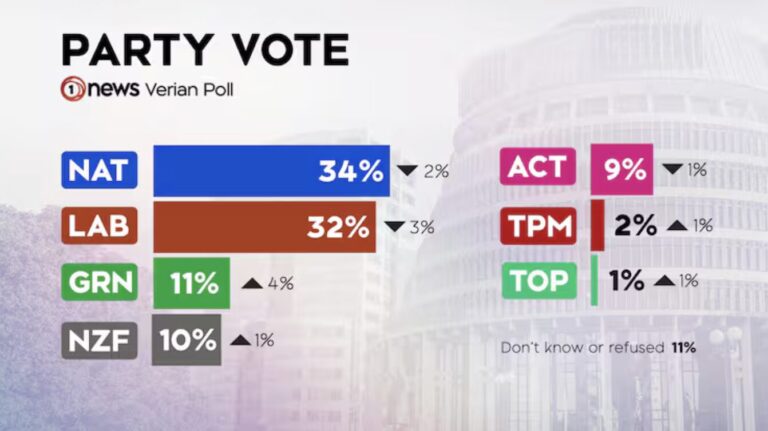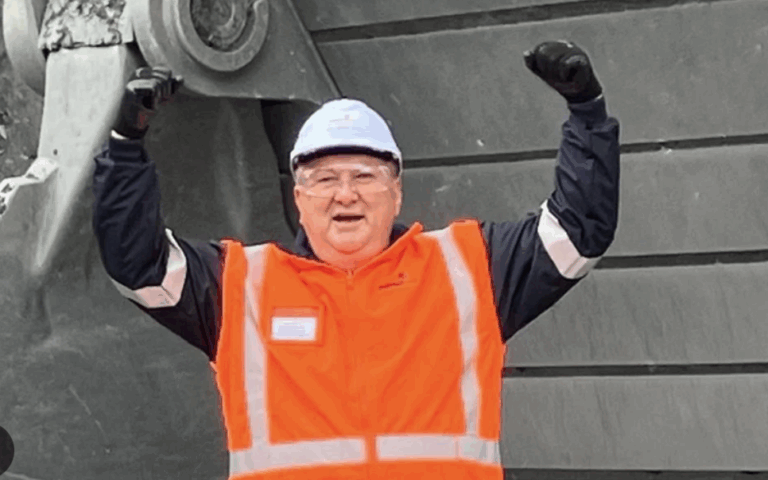The Daily Blog Open Mic – 26th October 2025
Announce protest actions, general chit chat or give your opinion on issues we haven’t covered for the day.
The Editor doesn’t moderate this blog, 3 volunteers do, they are very lenient to provide you a free speech space but if it’s just deranged abuse or putting words in bloggers mouths to have a pointless argument, we don’t bother publishing.
All in all, TDB gives punters a very, very, very wide space to comment in but we won’t bother with out right lies or gleeful malice. We leave that to the Herald comment section.
EDITORS NOTE: – By the way, here’s a list of shit that will get your comment dumped. Sexist abuse, homophobic abuse, racist abuse, anti-muslim abuse, transphobic abuse, Chemtrails, 9/11 truthers, Qanon lunacy, climate deniers, anti-fluoride fanatics, anti-vaxxer lunatics, 5G conspiracy theories, the virus is a bioweapon, some weird Bullshit about the UN taking over the world and ANYONE that links to fucking infowar.








AI –
https://lfpress.com/opinion/columnists/dyer-ai-adding-to-unstable-times
…Nobody in Silicon Valley is making rational calculations of return on investment any more. What drives the spending spree now is the conviction that really useful and profitable AI will magically emerge if you just scale up the computing power enough, and the last companies standing will inherit the Earth. Delusions of grandeur, in other words.
A run-of-the-mill stock market crash was getting overdue anyway – it’s been 17 years since the last one, not counting COVID – but the folly of the present boom may well make the crash deeper and the recovery slower than normal. The biggest players in the system are spending vast amounts of borrowed money on a technology they don’t even fully understand…
RNZ headline.
‘Cost to the economy enormous ‘. Storms, accidents, road closures hurt trucking industry.
Item: https://www.rnz.co.nz/news/national/576949/storms-accidents-road-closures-hurt-trucking-industry
,,,Several trucks were trapped on SH1 near Ward by a fatal three-vehicle crash on 14 October. One person died, and –
the National Road Carriers Association said the road was shut for nine hours.
In the same week, truckers were stuck due to slips in the Awakino Gorge. The association texted driver members in the area and across the North Island.
“It doesn’t change the fact that these drivers were stuck for hours, with no food, no toilets and no idea when they’d be able to move,” association chief executive Justin Tighe-Umbers said in a blog.Fatal and serious crashes were a different problem, but with a similar consequence.
“When our largest freight route is closed for nine hours, the cost to the economy is enormous,” Tighe-Umbers said.
The trade-off had to weigh the number of road fatalities that turned out to be crimes against “tens of millions of dollars” in lost productivity for the economy, he said…
(These self-interested well paid parties sure know how to rub in the difficulties. We actually already know and that is why we are so keen to keep NZ Rail going and cut down our dependence on expensive road carriers. Efficient maybe but we have a changeable demanding environment and are split into islands. )
An excerpt about transport around NZ this one by sea.
From a conference this year.
https://www.cbaff.org.nz/CBAFF-Conference/speakers
(Customs Brokers and Freight Forwarders Federation of NZ Inc.)
We work for our members to achieve the best outcomes for them and have developed excellent working relationships with many organisations including:
Manukau Institute of Technology Maritime Studies Advisory Group
NZ Dangerous Goods Air Transport Council
NZ Air Facilitation Council and Cargo Air Facilitation Committee.
International Federation of Freight Forwarders Associations (FIATA)
International Air Transport Association
International Air Transport Association Cargo Executive Council SWP
Tomorrows Cargo Logistics Group
The MAF/Industry Cargo Consultative Committee
Showcase Presentation
Seagliders & the Future of Coastal Freight
Wednesday 03 September : 3.50pm
__________
Ocean Flyer is set to introduce fully electric seagliders to New Zealand’s coastal routes, unlocking a new era of zero-emission, high-speed freight movement. This presentation will showcase how seagliders offer an unprecedented opportunity to move cargo smarter, faster, and cleaner, especially along key domestic coastal corridors. Operating at speeds of up to 300 knots per hour, these seagliders combine the efficiency of marine access with the speed of aviation, flying just metres above the water. Unlike airports, which are often on the city outskirts, seagliders use existing harbour infrastructure, placing freight right where it needs to be, in the heart of our CBDs and regional centres.
Ocean Flyer will walk us through, from 2022 and beyond, the operational model and expected cargo capability, infrastructure and safety considerations for port access, how this technology aligns with ESG and decarbonisation goals, opportunities for regional connectivity and agile, just-in-time logistics. This is more than a transport innovation, it’s a bold step toward the future of low-impact, high-performance coastal freight. Be among the first to see how New Zealand is positioned to lead
Note: There was reference to air cargo, but a lack of railway reference/presence.
I think this is a heavy burden of high skilled, well paid bodies for our little country to bear. Perhaps this overseas trade has more fishhooks than fish and getting more so over the years I think. No wonder planning something, doing scoping, costs millions of dollars.
Well how do we face this block-buster movie life we live in?
Prout is interesting – if you are dithering or confused and needing to do something else than read and listen to festering liars, excited gossips who know-all, doom cryers and finger-pointers and know that you have to get positively performing on this stage or go slowly mad, you hope, as it could be sudden! You could look at Prout.
– PROUT
https://en.wikipedia.org/wiki/Progressive_utilization_theory
Learn about it, it is different from the greed-greased slippery slope we are enabling or faltering on, you’d have something to relate to and may meet others who you want to do a project with. Lots of small projects could join hands and give us a net with big spaces but strong enough to catch and hold onto as we get further towards 1939 in our TARDIS* and the takeover by the Biggest Piranha.
Prout Course Description
Socio-economic alternatives to organize our economy and society based on principles of collective progress and care for the planet are imperative in the face of challenges posed by capitalism to humanity’s existence – wealth concentration, wealth inequality, climate catastrophes, and social injustices.
This course introduces students to an alternative model of socio-economic progress and development. Prout or Progressive Utilization Theory propounded by P.R. Sarkar is a holistic, systems-change alternative to the existing models of organizing the economy and society.
This course aims to develop an ideological and practical understanding of Prout, and explores Prout’s foundation in the values of Neohumanism. Over 12 weeks, with assigned readings, and class discussions, students will delve deeper into core Prout concepts such as Cosmic Inheritance, Social Cycles, Cardinal Human Values, Economic Democracy, Cooperatives, Ethical Leadership, and Political Systems in Prout.
Experience a completely unique learning journey! Students will:
· Learn the basic principles of Prout and understand Prout within the context of Neohumanism;
· Draw necessary connections between existing economic theories and Prout, and learn to discern the differences;
· Develop the ability to think about organizing the society and economy with a human-centered and planet-centered mindset;
· Appreciate Prout as a viable socio-economic alternative to the existing
systems;…
Video Description
Course start & end dates: November 1, 2025 – January 24, 2026
Duration: 1.5hr. Live online 12-week course on Sundays
Start times:
12.00 – 1.30pm (NZ time)
Price: $300 USD,
or
email info@nhca.gurukul.edu with the amount you can pay and we will make a coupon for that amount.
*TARDIS – Time And Relative Dimension (s) In Space
https://en.wikipedia.org/wiki/TARDIS
Maori wisdom and nous. Trying to work out the best way to cope with this business and marine environment we live in. Maori are thinking hard about practical and good ways of coping now and the future. This is one field of contention:
https://www.nzherald.co.nz/northern-advocate/news/northland-group-seeks-judicial-review-of-northport-expansion-appeal/4CGOTYBB3VEJ3FM7YECX72WMFM/
A suitable caption competition heading; ‘Donald Trump Gazarises the Whitehouse’
Surprise, surprise, after knocking down the East Wing of the Whitehouse, Donald Trump is to name his new throne room after himself.
https://www.stuff.co.nz/world-news/360866158/trump-will-reportedly-name-new-white-house-ballroom-after-himself
Health who needs it. What good are medicines, we might get better than get sick again with something else perhaps.
https://www.scoop.co.nz/stories/GE2510/S00064/new-report-shows-nz-is-a-major-outlier-with-lowest-medicines-investment-levels-compared-to-other-oecd-countries.htm
A comparative analysis of government and compulsory health budgets between 13 similar OECD countries has established that New Zealand has the lowest level of investment in medicines and is seen as a ‘major outlier’ in its health funding allocations.
The research undertaken by the New Zealand Institute of Economic Research (NZIER) determined that only 4.9% of New Zealand’s public health budget is spent on medicines. That figure is almost 3 times lower than the OECD country average of 13.3%.
The report notes that this major outlier status and low medicine investment levels are problematic, given the well-established benefits that medicines deliver to public health systems. These include assisting the system and health workforces with efficiency and productivity gains, and in some cases, medicines being able to substitute for health services and infrastructure burden, for example, by reducing patient hospitalisation.
“Medicines are one of the most effective tools we have to improve both patient health outcomes and ease pressure on hospitals and the health system,” said Dr Graeme Jarvis, CEO of Medicines New Zealand. “Our country’s low level of government investment in medicines compared to equivalent OECD nations means that both patients and the health system and workforce are missing out on these benefits.”
You know the ABC Australia does some wonderful work sometimes. This video below on the reconstruction of Gaza, is wonderful, but at the same time down right depressing. The worst part, no one is talking about even where to start apart from clearing the roads to getting the hospitals, plus clean water back up and running. On the issue of reconstruction alone, I can’t see this conflict ending anytime soon. Let alone all the other issues which make Gaza the worlds largest open air prison.
https://www.youtube.com/watch?v=qBsxXZ7d9xM